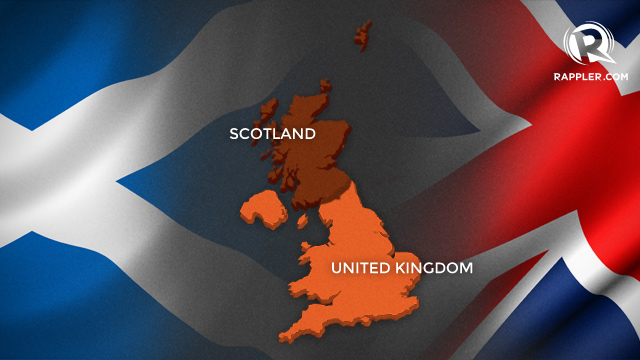SUMMARY
This is AI generated summarization, which may have errors. For context, always refer to the full article.

GLASGOW, Scotland – An independent Scotland would keep the pound and the British monarchy but establish its own defense force, First Minister Alex Salmond said Tuesday, November 26, as he unveiled detailed proposals ahead of next year’s referendum.
Launching his regional government’s long-awaited blueprint for leaving the United Kingdom, the nationalist leader said he could build a “wealthier and fairer nation” if Scots vote on September 18 to dissolve the 300-year-old union with England.
“We’d become independent in more promising circumstances than virtually any other nation in history,” Salmond told a news conference at the Glasgow Science Centre.
“Ultimately at the heart of this debate there is only one question and one choice.
“Do we, the people who live and work in Scotland, believe that we are the best people to take decisions about Scotland’s future?”
The prospectus, “Scotland’s Future: Your Guide to an Independent Scotland”, tackles 650 questions on the practicalities of going it alone.
The so-called “white paper” also sets out policies that Salmond’s Scottish National Party (SNP) would introduce post-independence, in areas such as corporate taxation, pensions, childcare, education, defense and welfare.
In a key announcement, the blueprint says an independent Scotland would no longer host Britain’s Trident nuclear missile deterrent.
Scotland would though remain part of the European Union and NATO – something pro-unionists say is not as straightforward as Salmond makes out.
On the economy, the document says more than 90 percent of Britain’s oil and gas revenues come from fields that would lie within an independent Scotland’s waters, providing a major source of income.
The new state would have to tackle a “legacy of debt, low growth and social inequality” that it says Scotland would be bequeathed by the British government.
Edinburgh would “agree a share of the national debt” with London, ranging between £3.9 billion and £5.5 billion (4.7 billion euros and 6.6 billion euros, $6.3 billion and $8.9 billion).
Scotland would keep the pound as its currency, with Scotland assuming a share in the Bank of England, Britain’s central bank.
Queen Elizabeth II would remain the head of state, while a Scottish Broadcasting Service would replace the BBC as the national broadcaster.
Salmond was in jovial form as he fielded questions, assuring Scottish viewers they would still be able to watch their favorite BBC programs.
Citizens would be automatically entitled to a Scottish passport, while there would be no controls on the English border as Scotland would remain within the existing British Isles common travel area.
‘It’s about the whole future of Scotland’
Salmond hopes the blueprint will swing undecided voters.
Some 38 percent currently favor independence, according to a Panelbase survey for the Sunday Times newspaper, while 47 would vote against.
The leader of the “no” campaign, former British finance minister Alistair Darling, said the white paper contained nothing new and it was “complete fantasy to believe that you can leave the UK but keep all the benefits”.
“No one is going to tell me that all the good things will stay north of the border and all the bad things will go to the south,” he told BBC radio.
Britain’s Conservative Prime Minister David Cameron and his coalition government with the Liberal Democrats is pushing hard for a “no” vote, as is the opposition Labor Party.
Cameron’s spokesman said the white paper “doesn’t really answer the big questions around the currency, fiscal sustainability and Europe, just to take three very important major issues.”
Alan, 56, an unemployed Glaswegian who was cycling past the Science Center, said he was not convinced by Salmond’s prospectus.
“It’s probably as full of fantasy as the last Harry Potter book,” he told Agence France-Presse.
“I’m not totally against independence. I love Scotland.
“But why try to fix something that’s not broke? I think Mr Salmond’s policies have yet to be proven.”
But Tom Smith, 74, a retired doctor from Ayrshire who was strolling over the River Clyde, said he would like to see an independent Scotland.
“The vote depends on whether you think this is a small thing about taxes and what’s happening now in politics or a big thing about the whole future of Scotland for generations to come,” he said.
The document plans for Scotland to celebrate its independence day on March 24, 2016 and hold its first parliamentary elections two months later.
March 24 marks the anniversary of the signing of the Acts of Union in 1707, which joined Scotland and England into one kingdom.
Scotland’s devolved government currently controls a range of policies including health and education, but other major areas – including taxation, defense, foreign policy and welfare – are dictated by London. – Rappler.com
Add a comment
How does this make you feel?
There are no comments yet. Add your comment to start the conversation.